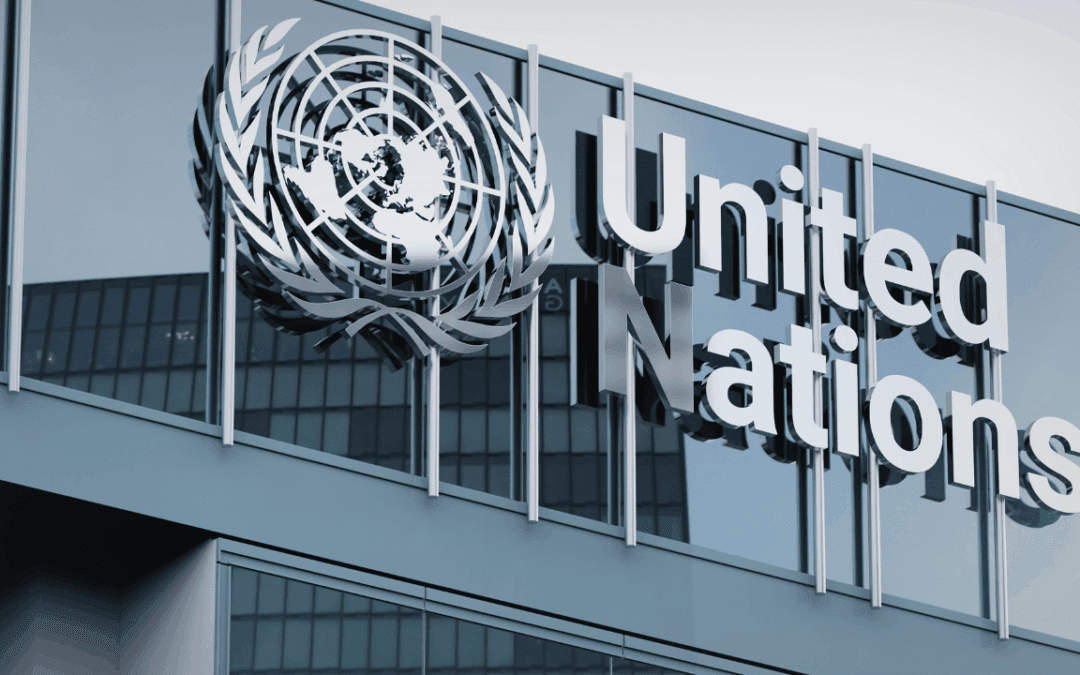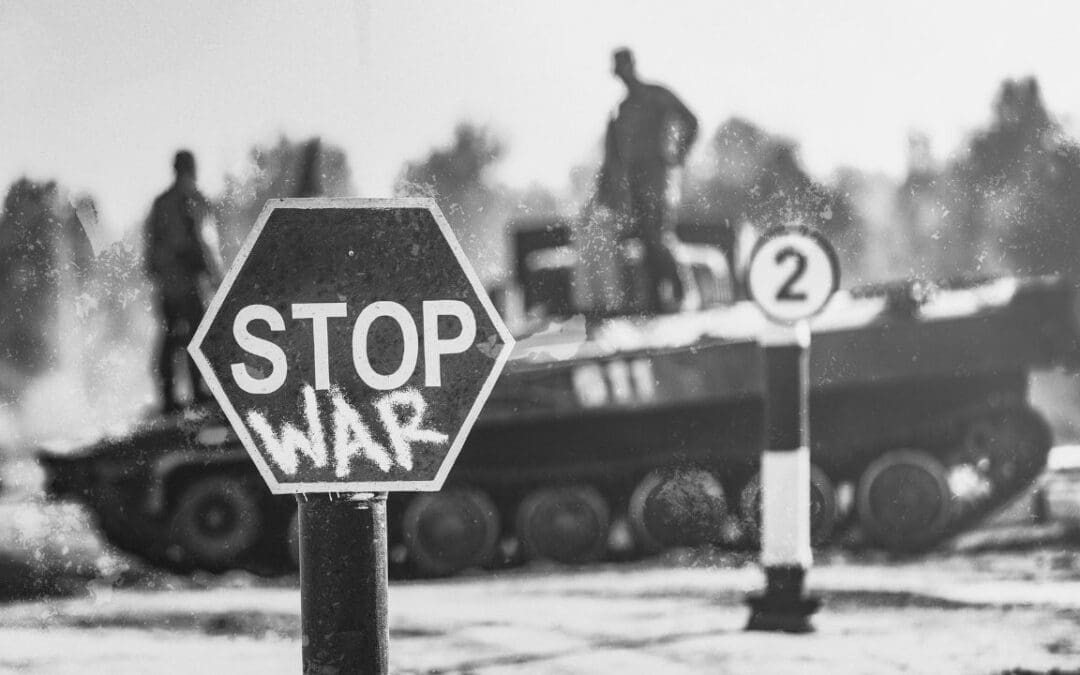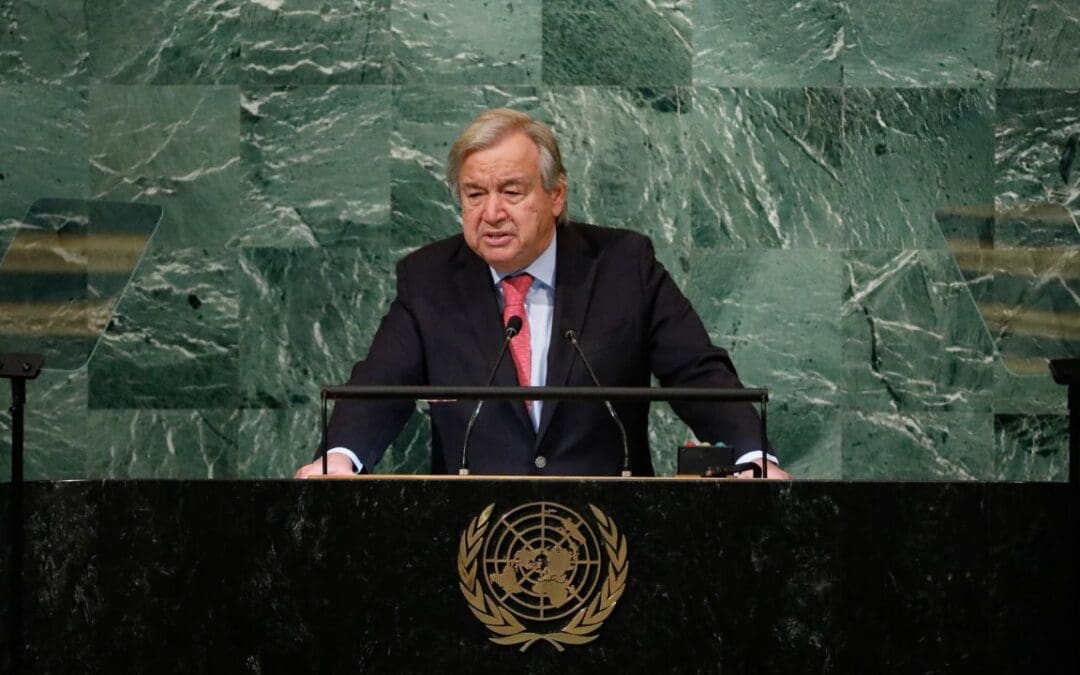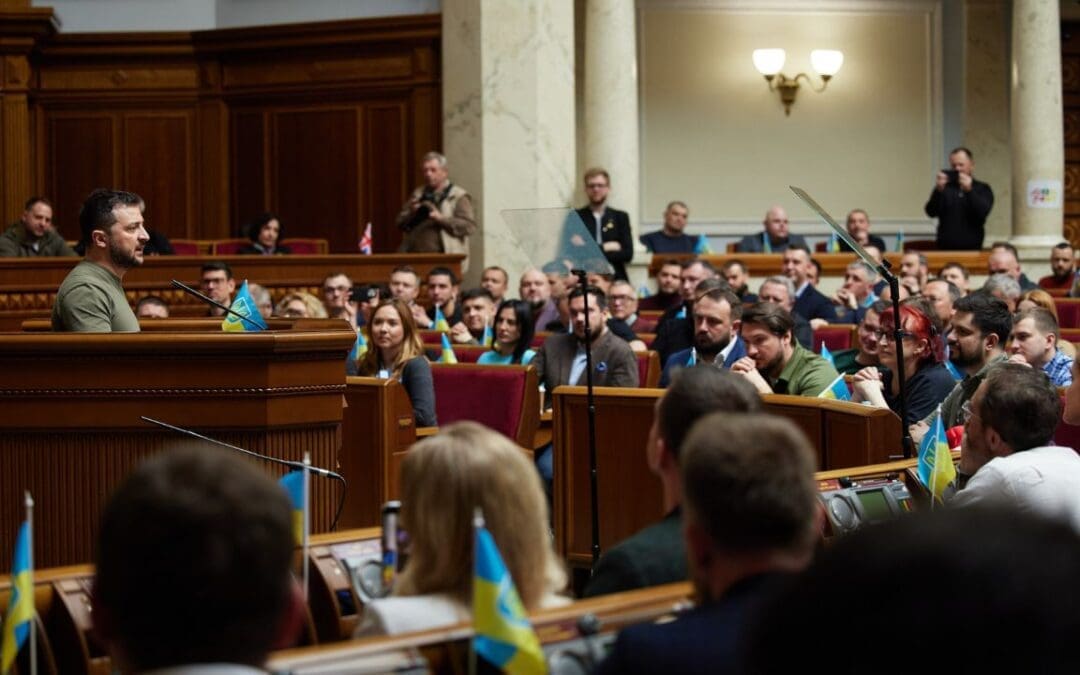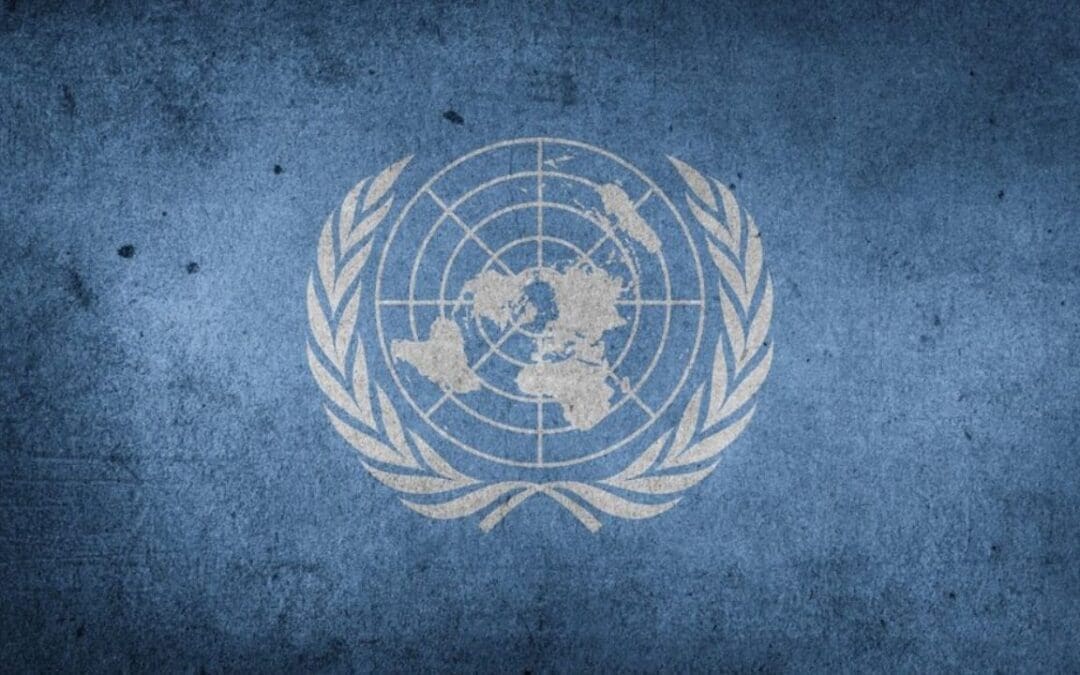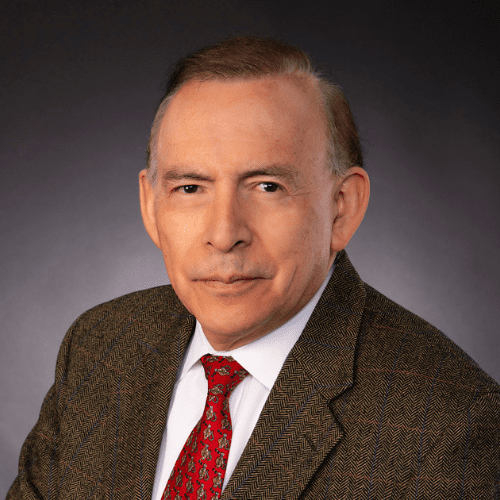
by Lawrence Wittner | Nov 25, 2025 | UN Reform
Although the world is experiencing severe global crises, there are new efforts underway to create a more effective means of coping with them.
The crises are clear enough. They include vast slaughter in horrific wars, worldwide climate catastrophe, massive population displacement, and deepening poverty.
Moreover, these disastrous situations are likely to worsen in coming years. Modern wars are fought with increasingly devastating weapons, and preparations for nuclear war have escalated to the level of global annihilation. Similarly, time is running out for saving the planet from an environmental cataclysm, which will surely lead to heightened displacement and poverty.
There is, of course, a global organization formally tasked with tackling global problems: the United Nations. And the officials of that international entity do frequently make admirable recommendations for how these problems can be solved. Indeed, there is a consensus among most of the UN’s 193 nations about what should be done to preserve a decent future for humanity: end the wars; foster nuclear disarmament; sharply reduce the burning of fossil fuels; assist refugees; promote social progress; and feed the hungry.
The problem is that the United Nations, despite its virtues, remains at the mercy of the major military and economic powers that created it. And they are not only frequently at odds with one another, but are usually determined to see to it that their national interests―as they define them―prevail over the interests of the world community.
When it comes to international security, each of the five permanent members of the UN Security Council (Britain, China, France, Russia, and the United States) can veto UN action―and all too often do so.
When it comes to UN efforts to address climate change, the situation is not much better, for the great powers continue to burn and (as in the case of Russia and the United States) extract and profit from selling vast quantities of fossil fuel. Consequently, they weaken or sabotage UN-sponsored climate agreements.
Another way the great powers hamstring the United Nations is by abandoning its operations and reducing its meager funding. The U.S. government, under Donald Trump, is particularly flagrant in this regard, pulling the United States out of key UN agencies and slashing voluntary contributions and mandated dues payments to the world organization. As of this October, the United States has compiled a debt of $1.5 billion in mandated funding to the United Nations, followed by China ($192 million) and Russia ($72 million).
Frustrated by the UN’s inability to adequately handle global challenges, a network of civil society organizations, scholars, policy experts, and diplomats took action on September 22, 2025 to launch Article 109, an international coalition to mobilize public opinion, social movements, and national governments to activate a UN Charter Review conference.
When the UN Charter was signed in 1945, the document’s drafters provided for its evolution through Article 109, which states that a Charter Review Conference can be launched by a two-thirds vote of the General Assembly and any nine (formerly seven) members of the Security Council. As today’s Article 109 Coalition observes, this conference could update and empower the United Nations by enacting structural changes (e.g., reforming the Security Council, creating a UN Parliamentary Assembly, and establishing a Climate Council), as well as by making normative upgrades (e.g., supporting gender equality).
More than 40 civil society organizations are now part of the Article 109 Coalition. They include global campaigning organizations like Oxfam International, Democracy Without Borders, the Global Governance Forum, and the World Federalist Movement/Institute for Global Policy; regional organizations in Africa and Latin America; think tanks like the Quincy Institute for Responsible Statecraft; and national organizations like EYC (which empowers youth in Cambodia) and Citizens for Global Solutions (which organizes in the United States). The Club de Madrid, a recent endorser of Charter review, is a forum that brings together more than 100 former Heads of State.
Indeed, recent heads of state and current government officials participated prominently in the September 22 launch event. Mary Robinson, former Irish President and UN High Commissioner for Human Rights, delivered the keynote address. She was followed by Alexander De Croo (former Belgian Prime Minister), Helen Clark (former New Zealand Prime Minister and UN Development Program Administrator), and Ambassador Muhammadou Kah (The Gambia’s Permanent Representative to the UN in Geneva).
UN Charter review has several potential drawbacks. For example, it could end up producing an amendment that reduces the purview of the international organization. Furthermore, the process will be lengthy. The Article 109 Coalition envisions a UN vote in 2027 to authorize a Charter review conference to convene in 2030. Finally, any amendment to the Charter must be ratified not only by two thirds of the UN membership, but by all permanent members of the Security Council―the five great powers that have helped enfeeble the world organization.
But these obstacles could be overcome. If there is a major campaign to strengthen the UN among members of the public, organizations, and nations, an amended Charter is likely to produce a more robust international institution. In addition, delaying a review conference until 2030 will provide the Article 109 campaign with the time to gather momentum and, also, increase the likelihood that some or all the world’s most stridently nationalist rulers (e.g., Trump, Vladimir Putin, and Benjamin Netanyahu) are no longer in office. Indeed, who really knows what kind of reforms the leadership of the Security Council’s five permanent members would be willing to accept in the future, especially if global conditions worsen and there is substantial worldwide pressure for action?
Farsighted national leaders, at least, are ready for the challenge and, like Brazilian President Luiz Inácio Lula da Silva, are busy organizing for UN Charter Review. Addressing the September 2025 launch of the Article 109 campaign, Ireland’s Mary Robinson spoke out decisively for UN empowerment, proclaiming: “The moment has come, and we need to be brave.”

by Jerry Tetalman | Oct 14, 2025 | Peace, UN Reform
Since the Russian invasion of Ukraine, the major countries of the world have been aligning in two different blocs: NATO (which includes most European nations, the United States, and Canada), Japan, and South Korea, on one side, and Russia, China, North Korea, Iran, and India on the other. Both blocs of countries are supporting their side in the war with weapons, trade, or troops. The negotiations to end the Ukraine-Russia war have so far failed due to Vladimir Putin’s reluctance to engage. NATO has so far only supplied weapons and military support. Still, it has been careful not to confront Russia with troops directly―probably because Russia has a large nuclear arsenal and the United States and NATO are trying to avoid a full-scale war. This strategy, so far, has resulted in a protracted stalemate.
If allowed to spread and escalate, however, the Ukraine-Russia war might trigger World War III.
So, how does the United States deal with this dilemma? One option is to do more of what it has been doing: provide more weapons and sanctions, in the hope that they will bring Putin to the negotiating table in earnest. Another, more daring approach is to look at what causes war and then address the root cause of war.
We live in a world where most nations or groups of nations solve their disputes through military force rather than the force of law. But in some parts of the world, we have replaced war with law and government. For example, the European Union has created peace between its member states, such as France and Germany, countries that had fought bitterly against one another in World Wars I and II. Now these nations settle their disputes by voting in the European Parliament and the European Union courts.
Why has the European Union succeeded in creating peace among its members while the United Nations has failed in these efforts? The answer lies in the fact that the United Nations is based on treaty law, a voluntary system of agreements among nations that lacks an enforcement mechanism that true law uses.
A new, more powerful, and democratic United Nations, however, could create peace among the world’s countries. By convening a UN reform conference under Article 109 of the UN charter, it would be possible to engage the world’s nations in creating a rules-based system of international law that is enforceable rather than voluntary. Building a civilized world based on law and rules, rather than on military power, would create a global framework for peace, and hopefully, reverse the schism of the world into warring camps.
Would such a framework solve the Russia-Ukraine war? Not directly, but it would provide an institution capable of resolving it.
If left on their current trajectory, international relations and military conflict will soon reach a dark place that will be difficult to recover from. The alternative is not radical; indeed, rules and laws provide the basis of civilization, and today they are desperately needed at the international level. These can be provided by a structure of limited world government, similar to that of the European Union. Individual nations would remain free to develop their own laws dealing with their internal affairs, but, in international affairs, they would abide by the laws between countries. In this fashion, a small piece of sovereignty would be exchanged for a peaceful world.
The world’s nations can begin this process by invoking Article 109 of the UN Charter to call for a global conference to craft a new, more effective United Nations. For such a mission to succeed, many details must be worked out, but the alternative of more war and destruction is unacceptable.

by Augusto Lopez-Claros and Daniel Perell | Oct 29, 2023 | UN Reform
It seems each day provides us a fresh reason for pessimism. A new demonstration of the fraying social contract, especially at the international level. The pillars upon which the international order was built seem to be rapidly deteriorating—from territorial integrity to the laws of war to the breaking of promises—and we find ourselves asking: what is to be done? There is no need to provide a comprehensive summary here of the risks we face; compelling diagnoses exist of what ails the world and there is no shortage of sensible prescriptions. The UN Secretary General’s Our Common Agenda is a good recent example as are many other reports and analyses with a narrower focus, touching upon issues of climate and the environment, security, poverty and inequality, financial sector vulnerabilities, and other such risk factors.
There is also growing acceptance of the view that these problems are generally global in nature; they are transnational. Solutions to them can best be framed in a context of much stronger international cooperation. It is for this reason that the debate about actions to confront them often ends up with a focus on the system of multilateral institutions that emerged out of the ashes of World War II.
UN Reform a nonstarter?
One aspect of this debate is whether, against the current geopolitical background, it would even be prudent to talk about reforms to our global governance architecture. With the “abysmal political climate for international cooperation, with deep rifts and mistrust” some argue that “reform is a nonstarter,” that it is Alice in Wonderland to “discuss reforming the UN while ignoring the brutal contemporary political realities.”
Implicit in this position is the notion that time is on our side, that we can afford to wait for the ‘right’ geopolitical moment. And, until the stars align again, our task lies in making minor adjustments. Secretary-General Kofi Annan told the General Assembly in 2003 “we have reached a fork in the road.” This thought has been repeated countless times by other Secretaries-General, by well-meaning heads of state and, it is assumed, will continue to be repeated through 2045, the 100th anniversary of the adoption of the UN Charter.
But insights coming from systems science about the breaching of planetary boundaries—to take just one example—demonstrate that time is not on our side, that we have a rapidly narrowing window of opportunity to address and hopefully mitigate the worst effects of the coming environmental calamities. Or, likewise, to reduce the likelihood of the use of nuclear weapons in one of the many unresolved conflicts bubbling around the world. What, then, is to be done?
Three viable paths
There seem to be three viable paths, which can be pursued concurrently. The first path is to recommit ourselves to the system we have. There are tremendous benefits to this—most notably that it would be a return to consensus. At this moment of great crisis, there is a legitimate case to be made that the safest route is the surest route—at least in the short term. However, that is also a limiting prospect and runs the risk of determining that the best we can do is to continue doing what we have already done. Perhaps more importantly, if we are conscious that the system as it stands is increasingly insufficient, by choosing only this path we are in a way admitting defeat at the outset.
The second course of action is to take the model we have and innovate. This is the course of action offered through the upcoming Summit of the Future and its attendant proposals including a New
Agenda for Peace, proposals for financial architecture reform, and even Article 109. There is significant merit in this course of action, as well: it offers an opportunity for questioning the structures we have without undoing the progress they have made. In other words, it allows for organic growth. Yet, there are risks here, too—in that we could end up investing significant time and energy to perpetuate a system ill-suited to our interconnected reality; or that we achieve only marginal progress, or, worse still, the process results in greater political fragmentation and mistrust.
The third course of action is a deeper exploration into the persistent challenges underlying our current systems and a search for new solutions. Essentially, questioning underlying assumptions and finding new answers. This course of action excites us most—in large part because we do not believe that the current frameworks are sufficient for the world of today, let alone tomorrow. In other words, when we imagine a century ahead, we just can’t picture a global governance system where Member States are expected, even required, to prioritize their domestic concerns when discussing international matters. We can’t imagine that a successful governance system would continue to prioritize a profit motive, a power motive, over the wellbeing of citizens and nature. Yet the system we have (even if modified as in option two) does just this. We will also be the first to admit that this may not be the most politically realistic course for today, but it will one day be the path we must choose. Why not begin it now given its far-reaching implications?
We do not need to choose merely one of these three options. We are at a moment where many opportunities open before us. The international order is struggling under the weight of the crises we face—both new and old. Let us use this consensus as a starting point to commit to what we have, to see what meaningful change can come from the processes in progress, and to rethink the current order from our starting assumptions. In essence, a little bit of each viable path is the ultimate expression of the precautionary principle for global governance.
Overcoming paralysis
One problem with concluding that the current political impasses make UN reform a nonstarter is that it leads to paralysis. It results in proposals that are the intellectual equivalent of rearranging the deckchairs as the ship is sinking. We are not suggesting ignoring the political realities of this moment but trying to see what the future holds. One day, we will need to move beyond traditional paradigms, beyond “reinforcing the crumbling foundations” of the current system. Humanity will need to articulate a new architecture, better suited to the needs of a rapidly changing humanity.
Importantly, it is not only governments who can advance this conversation—in fact this might be a key to overcoming some of the seemingly intractable obstacles to reform. As was noted in A Second Charter: Imagining a Renewed United Nations, numerous global governance innovations over the past quarter century were not initiated by governments. They started with civil society organizations: the Land Mines Treaty, the creation of the International Criminal Court, and the adoption of the Treaty on the Elimination of Nuclear Weapons, to cite some recent examples. At a later stage, many governments adopted them. This is the “new diplomacy” in action.
At the end of World War II, and because of the destruction created by that conflagration, humanity had an opportunity to imagine something better suited to the needs of, in particular, the European continent. If in 1945 one had ventured to suggest that within a generation Europe would be advancing a project of economic and political integration, that by the late 1970s there would be direct elections for members of an increasingly influential European Parliament, and that by end of the century the broad parameters of monetary policy would be set by a European Central Bank based in Germany managing a single currency, one might have been accused of “Wonderland thinking”. And yet, it was the very political turmoil of that moment which allowed for this evolution to take place.
Today, we cannot afford to wait for what is called a “San Francisco” moment. Recall how that gathering came only after a global catastrophe prompted humanity to dare to think differently and engage in a reform process. Yet, today’s generation is carrying the legacy of the imperfections bequeathed to it. Let us not wait for another catastrophe before we engage in meaningful reform processes. In addition to recommitting to promises made, in addition to technical modifications, let us take that leap of imagination necessary to prevent future global catastrophes. Who knows, perhaps in a few decades, like the European case, future generations will be amazed at what we were able to achieve.
This article was originally published in Global Governance Forum’s blog.
Image Source: Palácio do Planalto from Brasilia, Brasil, CC BY 2.0, via Wikimedia Commons

by Lawrence Wittner | Sep 27, 2023 | UN Reform
Addressing the UN Security Council on September 20, 2023, Ukrainian President Volodymyr Zelensky delivered a heartfelt plea “to update the existing security architecture in the world, in particular, to restore the real power of the UN Charter.”
This call for strengthening international security under the aegis of the United Nations makes sense not only for Ukraine―a country suffering from brutal military invasion, occupation, and annexation by its much larger, more powerful neighbor, the Russian Federation―but for the nations of the world.
The Rise of the United Nations
For thousands of years, competing territories, nations, and empires have spilled rivers of blood and laid waste to much of the world through wars and plunder. Hundreds of millions of people have died, while many more have been horribly injured or forced to flee their shattered homelands in a desperate search for safety. World Wars I and II, capped off by the use of nuclear weapons to annihilate the populations of entire cities, brought massive suffering to people around the globe.
In 1945, this mad slaughter and devastation convinced far-sighted thinkers, as well as many government leaders, that human survival was dependent upon developing a framework for international security: the United Nations. The UN Charter, adopted in a conference in the spring of that year in San Francisco by 50 Allied nations, declared that a key purpose of the new organization was “to maintain international peace and security.”
The UN Charter, which constitutes international law, included provisions detailing how nations were to treat one another in the battered world emerging from the Second World War. Among its major provisions was Article 2, Section 4, which declared that “all members shall refrain in their international relations from the threat or use of force against the territorial integrity or political independence of any state.” Furthermore, Article 51 declared that “nothing in the present Charter shall impair the inherent right of individual or collective self-defense if an armed attack occurs against a member of the United Nations.”
The Role of the Security Council
Although the UN Charter provided for a General Assembly in which all member nations were represented, action to maintain international peace and security was delegated primarily to a UN Security Council with fifteen members, five of whom (the United States, the Soviet Union, China, Britain, and France) were to be permanent members with the right to veto Security Council resolutions or action.
Not surprisingly, the right of any of these five nations to block Security Council peace efforts, a right they had insisted upon as the price of their participation in the United Nations, hamstrung the world organization from enforcing peace and international security on numerous occasions. The most recent instance has occurred in the case of the Ukraine War, a conflict in which, as Zelensky lamented, “all [Security Council] efforts are vetoed by the aggressor.” As a result, the United Nations has all too often lacked the power to enforce the principles of international law confirmed by its members and enshrined in its Charter.
Some people are perfectly content with the weakness of the United Nations. Fierce nationalists, including some Right-Wing actors, are contemptuous of this or any international security organization, and many would prefer its abolition. Others have little use for the United Nations but, instead, place their hopes for the maintenance of international peace and stability upon public and governmental acceptance of great power spheres of influence. Meanwhile, a segment of the international Left ignores the United Nations and insists that world peace will only be secured by smashing “U.S. imperialism.”
Sadly, those forces opposing international organization and action fail to recognize that their proposals represent not only a return to thousands of years of international strife and mass slaughter among nations, but, in today’s world, an open door to a nuclear holocaust that will end virtually all life on earth.
Proposals to Strengthen the United Nations
Compared to this descent into international chaos and destruction, proposals to strengthen the United Nations are remarkably practical and potentially effective. Zelensky has suggested empowering the UN General Assembly to overcome a Security Council veto by a vote of two-thirds or more of the Assembly’s nations. In addition, he has proposed expanding the representation of nations in the Security Council, temporarily suspending membership of a Security Council member when it “resorts to aggression against another nation in violation of the UN Charter,” and creating a deterrent to international aggression by agreeing on the response to it before it occurs.
Of course, there are numerous other ways to strengthen the United Nations as a force for peace and to help ensure that it works as an effective international agency for battling the onrushing climate catastrophe, combating disease pandemics, and cracking down on the exploitative practices of multinational corporations. Its member nations could also rally behind the UN Treaty on the Prohibition of Nuclear Weapons (still unsigned by the nuclear powers), agree on a UN program to handle the burgeoning international refugee crisis, and provide the world organization with substantially greater financial resources to reduce global poverty and mass misery than it currently receives.
Indeed, the horrific Ukraine War is but the latest canary in the coal mine―the danger signal that people of all nations should recognize as indicating the necessity for moving beyond national isolation and beginning a new era of global responsibility, cooperation, and unity.
Image source: Wikimedia Commons

by Daniel Perell | Jul 21, 2023 | UN Reform
Regular attendees of the High Level Political Forum (or similar spaces) might well get the sense that the world is nearly beyond repair. Each report, each speech, begins with a recitation of the numerous tragedies and ills befalling humanity – the polycrisis as it has come to be known. Hearing it again and again, I often wonder whether this practice is meant to somehow establish the credentials of the speaker. I also wonder whether, when everyone is quite aware of the precipice on which we stand, it might be helpful to start from a different perspective.
I recently joined several prominent civil society actors and high ranking government officials at an informal gathering where our convenor, the Minister of Development from a large country, asked us all to start by sharing something from the global landscape that brought us hope. No one at that table was unaware of the realities facing the world. But, for a short time, we were able to share mutual victories and offer suggestions for how they could be repeated.
The exercise was impactful. One delegate turned to me after and remarked that these kinds of conversations could be helpful to anyone feeling the weight of the world on their shoulders. A conversation about hope, he seemed to suggest, is a source of hope itself.
Starting with such a posture can help us in many circumstances, without minimizing the very real challenges we face. This posture is not unusual in other dimensions of life: in athletics, it is important to envision what success looks like before the start of a competition. Patients in rehabilitation are encouraged to channel a can-do attitude. This is not soft science: it can have a measurable impact on outcomes.
Listening to 30 minutes of hopeful interventions built a sense of shared optimism among us in that room, which carried over as we began to address a variety of pressing problems. It also illustrated a deeper principle, and one that is relevant to the multilateral system; namely, that progress is achieved most sustainably by building on our strengths, not by criticizing our weaknesses.
Yes, of course, there is utility in identifying gaps and shortfalls. Learning requires this honesty. But we cannot draw on capacities we have not yet developed; we cannot deploy resources that do not yet exist. At the end of the day, we work with the tools we have, not the tools we lack.
The question the Minister of Development posed was broad, but the responses it elicited were specific and practical. Colleagues and partners did not reply with abstract hopes, but with specific reasons for hope, such as abilities gained, lessons learned, successes achieved, and positive trends already underway. Constructive contributions inspire because of the promise they hold—justified and rational—for further progress and advancement going forward.
Today, as the international community moves toward the Summit of the Future and the second half of the 2030 Agenda for Sustainable Development, we would do well to organize ourselves more and more according to the principle of building from one strength to the next. Without ignoring hard realities, our opening protocols can allow us to share and draw from successes being achieved around the world.
We all aim to build a better world. Through positive, constructive language and examples, we encourage progress by inspiring each other and learning what is working. This, in itself, accelerates bringing that hopeful world into being.
*This was originally published on the Bahai’ International Community’s website.

by Lawrence Wittner | Oct 13, 2022 | Peace, UN Reform
The war in Ukraine provides us with yet another opportunity to consider what might be done about the wars that continue to ravage the world.
The current Russian war of aggression is particularly horrific, featuring a massive military invasion of a smaller, weaker nation, threats of nuclear war, widespread war crimes, and imperial annexation. But, alas, this terrible war is but one small part of a history of violent conflict that has characterized thousands of years of human existence.
Is there really no alternative to this primitive and immensely destructive behavior?
Failed Alternatives
One alternative, which has long been embraced by governments, is to build up a nation’s military might to such an extent that it secures what its proponents call “Peace through Strength.” But this policy has severe limitations. A military buildup by one nation is perceived by other nations as a danger to their security. As a result, they usually respond to the perceived threat by strengthening their own armed forces and forming military alliances. In this situation, an escalating atmosphere of fear develops that often leads to war.
Actually, governments are not entirely wrong about their perception of danger, for nations with great military power really do bully and invade weaker countries. Furthermore, they wage wars against one another. These sad facts are not only demonstrated by the Russian invasion of Ukraine, but by the past behavior of other “great powers,” including Spain, Britain, France, Germany, Japan, China, and the United States.
If military strength brought peace, war would not have raged over the centuries or, for that matter, be raging today.
Another war-avoidance policy that governments have turned to on occasion is isolation, or, as its proponents sometimes say, “minding one’s own business.” Sometimes, of course, isolationism does keep an individual nation free from the horrors of a war engaged in by other nations. But, of course, it does nothing to stop the war—a war that, ironically, might end up engulfing that nation anyway. Also, of course, if the war is won by an aggressive, expansionist power or one grown arrogant thanks to its military victory, the isolated nation might be next on the victor’s agenda. In this fashion, short-term safety is purchased at the price of longer-term insecurity and conquest.
The More Promising Alternative
Fortunately, there is a third alternative―one that major thinkers and even, at times, national governments have promoted. And that is strengthened global governance. The great advantage of global governance is its replacement of international anarchy with international law. What this means is that, instead of a world in which each nation looks exclusively after its own interests―and thus, inevitably, ends up in competition and, eventually, conflict with other nations―there would be a world structured around international cooperation, presided over by a government chosen by the people of all nations. If this sounds a bit like the United Nations, that is because, in 1945, toward the end of the most destructive war in human history, the world organization was created with something like that in mind.
Unlike “peace through strength” and isolationism, the jury is still out when it comes to the usefulness of the United Nations along these lines. Yes, it has managed to pull the nations of the world together to discuss global issues and to create global treaties and rules, as well to avert or end many international conflicts and to use UN peacekeeping forces to separate groups engaged in violent conflict. It has also sparked global action for social justice, environmental sustainability, world health, and economic advance. On the other hand, the United Nations has not been as effective as it should be, especially when it comes to fostering disarmament and ending war. All too often the international organization remains no more than a lonely voice for global sanity in a world dominated by powerful, war-making nations.
The logical conclusion is that, if we want the development of a more peaceful world, the United Nations should be strengthened.
How the United Nations Could Be Strengthened
One of the most useful measures that could be taken would be to reform the UN Security Council. As things now stand, any one of its five permanent members (the United States, China, Russia, Britain, and France) can veto UN action for peace. And this is often what they do, enabling Russia, for example, to block Security Council action to end to its invasion of Ukraine. Wouldn’t it make sense to scrap the veto, or change the permanent members, or develop a rotating membership, or simply abolish the Security Council and turn over action for peace to the UN General Assembly―an entity that, unlike the Security Council, represents virtually all nations of the world?
Other measures to strengthen the United Nations are not hard to imagine. The world organization could be provided with taxing power, thus freeing it from the necessity for begging nations to cover its expenses. It could be democratized with a world parliament representing people rather than their governments. It could be bolstered with the tools to go beyond creating international law to actually enforcing it. Overall, the United Nations could be transformed from the weak confederation of nations that currently exists into a more cohesive federation of nations―a federation that would deal with international issues while individual nations would deal with their own domestic issues.
Against a backdrop of thousands of years of bloody wars and the ever-present danger of a nuclear holocaust, hasn’t the time arrived to dispense with international anarchy and create a governed world?
